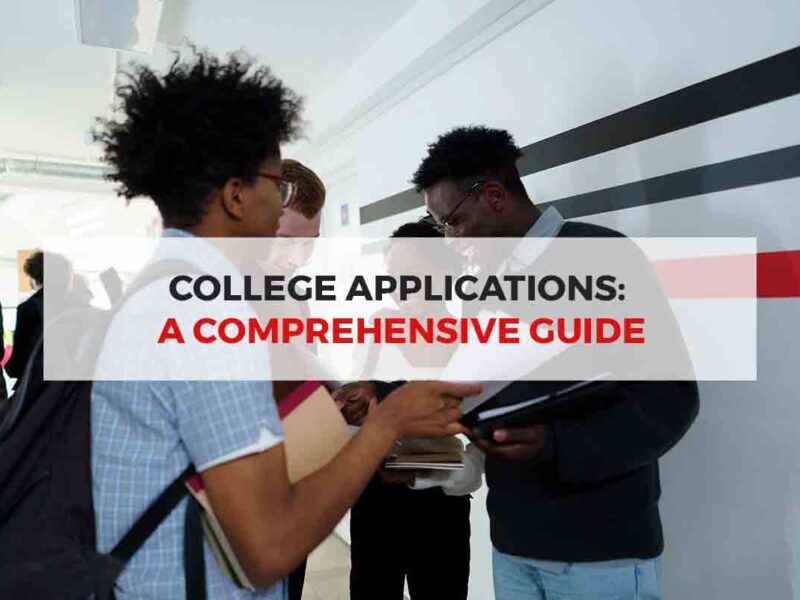Starting the journey of college applications can be both exciting and overwhelming. As you prepare to take this significant step towards higher education, it’s crucial to approach the process with careful consideration and strategic planning. This comprehensive guide aims to provide valuable insights into crafting a compelling personal statement, choosing the right college for your academic and personal goals, and understanding the application process and deadlines.
How To Be Successfully With College Applications: A Comprehensive Guide
- Crafting a Compelling Personal Statement:
Your personal statement is a crucial component of your college application, offering admissions officers a glimpse into your personality, experiences, and aspirations. Here are some tips to help you craft a compelling personal statement:
- Start Early:
Begin brainstorming and drafting your personal statement well in advance. This allows you ample time to reflect on your experiences, revise your writing, and seek feedback from teachers, counselors, or peers.
- Show, Don’t Tell:
Instead of listing achievements or qualities, use specific examples and anecdotes to illustrate your character and skills. This provides a more vivid and memorable picture of who you are.
- Highlight Growth and Learning:
Discuss challenges you’ve faced and how you’ve grown as a result. Admissions officers appreciate stories of resilience, adaptability, and a willingness to learn from experiences.
- Be Genuine:
Authenticity is key. Write about topics that genuinely interest you and align with your values. Avoid using overly formal or clichéd language; let your unique voice shine through.
- Choosing the Right College:
Selecting the right college is a crucial decision that can significantly impact your academic and personal growth. Consider the following factors to make an informed choice:
- Academic Programs:
Research the academic programs offered by each college. Ensure they align with your interests and career goals. Look for unique opportunities such as research projects, internships, or study abroad programs.
- Campus Culture:
Consider the campus culture and social environment. Look for colleges where you feel comfortable and supported. Attend campus tours, open houses, or virtual events to get a sense of the community.
- Location and Size:
Think about the location and size of the college. Do you prefer an urban or rural setting? Are you comfortable with a large or small campus? These factors can impact your overall college experience.
- Financial Considerations:
Evaluate the financial aspects of each college, including tuition, scholarships, and financial aid options. Create a budget to ensure that the cost of attendance is manageable for you and your family.
- Understanding the Application Process and Deadlines:
Navigating the application process can be complex, but a clear understanding of the requirements and deadlines will help you stay organized. Follow these steps:
- Research Application Requirements:
Review the specific requirements for each college, including standardized test scores, letters of recommendation, and supplemental essays. Ensure that you fulfill all the prerequisites for each application.
13, Create a Timeline:
Develop a timeline that includes all application deadlines, standardized test dates, and other essential milestones. Breaking down the process into manageable steps will help you stay on track.
- Seek Guidance:
Consult with teachers, counselors, or mentors for guidance throughout the application process. They can provide valuable insights, review your materials, and offer constructive feedback.
- Proofread Thoroughly:
Before submitting your applications, carefully proofread all written materials. Typos and errors can detract from the overall quality of your application. Consider asking others to review your work as well.
What looks best on college applications?
Demonstrated excellence in academics, active participation in extracurricular activities, strong letters of recommendation, and a compelling personal statement are key factors that can enhance the overall appeal of a college application.
What is the most important thing in a college application?
While each component is crucial, academic performance tends to be the most important factor in college applications. Strong grades and a challenging curriculum indicate a student’s ability to succeed in a college environment.
What grades do colleges look at the most?
Colleges primarily focus on a student’s cumulative GPA and grades in core academic subjects, especially those relevant to the chosen field of study. However, they also consider the rigor of the coursework, such as honors, AP, or IB classes.
What do colleges look at the most?
Colleges consider a holistic range of factors, including academic achievements, standardized test scores, extracurricular involvement, letters of recommendation, and the personal statement. A well-rounded application that showcases both academic prowess and personal qualities stands out in the admissions process.
Conclusion:
Navigating college applications requires careful planning, self-reflection, and a thoughtful approach. By crafting a compelling personal statement, choosing the right college for your goals, and understanding the application process, you can enhance your chances of gaining admission to the institution that best aligns with your academic and personal aspirations. Remember, this is a transformative journey, and each step brings you closer to the exciting possibilities that await in higher education.





